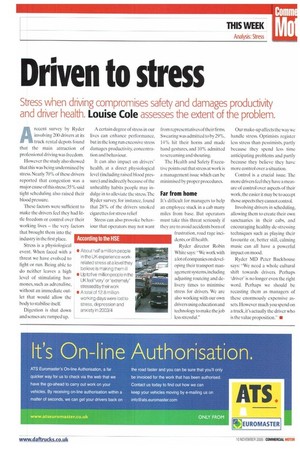Driven to stress
Page 21

If you've noticed an error in this article please click here to report it so we can fix it.
Stress when driving compromises safety and damages productivity
and driver health. Louise Cole assesses the extent of the problem.
Arecent survey by Ryder involving 200 drivers at its truck rental depots found that the main attraction of professional driving was freedom.
However the study also showed that this was being undermined by stress. Nearly 70% of these drivers reported that congestion was a major cause of this stress:35% said tight scheduling also raised their blood pressure.
These factors were sufficient to make the drivers feel they had little freedom or control over their working lives — the very factors that brought them into the industry in the first place.
Stress is a physiological event. When faced with a threat we have evolved to fight or run. Being able to do neither leaves a high level of stimulating hormones, such as adrenaline, without an immediate outlet that would allow the body to stabilise itself.
Digestion is shut down and senses are ramped up. A certain degree of stress in our lives can enhance performance, but in the long run excessive stress damages productivity, concentration and behaviour.
It can also impact on drivers' health, at a direct physiological level (including raised blood pressure) and indirectly because of the unhealthy habits people may indulge in to alleviate the stress. The Ryder survey, for instance, found that 28% of the drivers smoked cigarettes for stress relief Stress can also provoke behaviour that operators may not want from representatives of their firms. Swearing was admitted to by 29%, 14% hit their horns and made hand gestures, and 10% admitted to screaming and shouting.
The Health and Safety Executive points out that stress at work is a management issue which can be minimised by proper procedures.
Far from home it's difficult for managers to help an employee stuck in a cab many miles from base. But operators must take this threat seriously if they are to avoid accidents born of frustration, road rage incidents, or ill health.
Ryder director Robin White says: "We work with a lot of companies on developing their transport management systems, including adjusting routeing and delivery times to minimise stress for drivers. We are also working with our own drivers using education and technology to make the job less stressful." Our make-up affects the way we handle stress. Optimists register less stress than pessimists. partly because they spend less time anticipating problems and partly because they believe they have more control over a situation.
Control is a crucial issue. The more drivers feel they have a measure of control over aspects of their work, the easier it may be to accept those aspects they cannot control.
Involving drivers in scheduling, allowing them to create their own sanctuaries in their cabs, and encouraging healthy de-stressing techniques such as playing their favourite or. better still, calming music can all have a powerful impact on mood.
Ryder MD Peter Back house says: "We need a whole cultural shift towards drivers. Perhaps 'driver' is no longer even the tight word. Perhaps we should be recasting them as managers of these enormously expensive assets. However much you spend on a truck, it's actually the driver who is the value proposition." •






































































































































































































